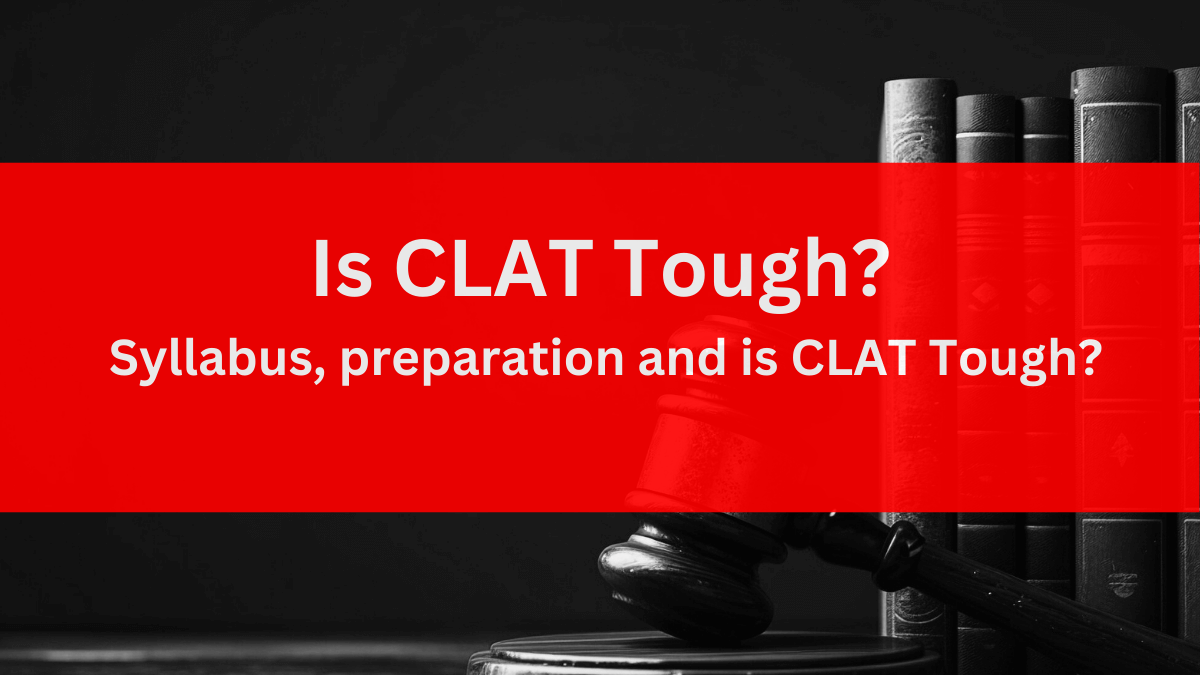Is CLAT Tough: Syllabus, Preparation and is CLAT Tough?
Is CLAT Tough?: The Common Law Admission Test (CLAT) presents a formidable challenge due to its rigorous nature and the high stakes involved in securing admission to top law schools and colleges. However, despite its difficulty, CLAT is considered achievable with focused preparation and the right approach.

CLAT is considered tough primarily because of its competitive nature. Many applicants compete for a limited number of seats in premier law schools, necessitating a high level of preparation and performance.
Moreover, the exam tests a wide array of skills and knowledge based on English, General Knowledge, Current Affairs, Logical Reasoning and basic knowledge of math and calculations requiring candidates to possess a diverse skill set and comprehensive understanding across these areas.
Get ready for the CLAT with our FREE MOCK TEST guided by our experts.
Despite these challenges, CLAT is doable. With dedicated preparation and a structured study plan, candidates can easily cover the syllabus and hone the required skills for each subject. CLAT’s predictable exam pattern allows candidates to strategize their preparation based on past trends and focus on areas of strength and improvement.
In this blog, we have mentioned the Syllabus, preparation tips, and Is CLAT Tough? answer.
UG Syllabus & Preparation
The UG-CLAT 2025 would focus on evaluating candidates’ comprehension and reasoning skills and abilities. Overall, it is designed to test aptitude and skills necessary for a legal education rather than prior knowledge. However, prior knowledge occasionally may be useful to respond to questions in the Current Affairs including the General Knowledge section.
The UG-CLAT 2025 shall be a 2-hour test, with 120 multiple-choice questions carrying 1 mark each. There shall be a negative marking of 0.25 marks for every wrong answer and no positive and negative marks on unattempted questions.
These questions will be divided into the following 5 subjects:
- English Language
- Current Affairs, including General Knowledge
- Legal Reasoning
- Logical Reasoning
- Quantitative Techniques
Know more: CLAT Time Management: The Key to Acing CLAT 2025
English Language
In this section of the UG-CLAT 2025, you will be provided passages of about 450 words each. These passages will be derived from contemporary or historically significant fiction and non-fiction writing, and would be of a standard that a 12th standard student may be able to read and solve in about 5-7 minutes.
Each passage will be followed by a series of questions that will require you to demonstrate your comprehension and language skills, including your abilities to:
- Read and comprehend the main point discussed in the passage, as well as any arguments and viewpoints discussed or set out in the passage;
- Draw inferences and conclusions based on the passage;
- Summarize the passage;
- Compare and contrast the different arguments or viewpoints set out in the passage; and
- Understand the meaning of various words and phrases in the context that they are used in the passage.
Current Affairs Including General Knowledge
In this section, you will be provided passages of up to 450 words each. The passages will be derived from news, journalistic sources and other non-fiction writing. The questions may include an examination of legal information or knowledge discussed in or related to the passage, but would not require any additional knowledge of the law beyond the passage.
Each passage will be followed by a series of questions that will require you to demonstrate your awareness of various aspects of current affairs and general knowledge, including:
- Contemporary events of significance from India and the world;
- Arts and culture;
- International affairs; and
- Historical events of continuing significance.
Legal Reasoning
In this section, you will be expected to read passages of around 450 words each. The passages may relate to fact situations or scenarios involving legal matters, public policy questions or moral philosophical enquiries. You will not require any prior knowledge of law to attempt the questions in this section. You will benefit from a general awareness of contemporary legal and moral issues to better apply general principles or propositions to the given fact scenarios.
Each passage would be followed by a series of questions that will require you to:
- Identify and infer the rules and principles set out in the passage;
- Apply such rules and principles to various fact situations; and
- Understand how changes to the rules or principles may alter their application to various fact situations.
Logical Reasoning
The Logical Reasoning section of the UG-CLAT 2025 will include a series of passages of about 450 words each. Each passage will be followed by one or more questions that will require you to:
- Recognise an argument, its premises and conclusions;
- Read and identify the arguments set out in the passage;
- Critically analyse patterns of reasoning, and assess how conclusions may depend on particular premises or evidence, and how conclusions may be strengthened or weakened as a consequence of an alteration in premises or supporting facts;
- Infer what follows from the passage and apply these inferences to new situations;
- Draw relationships and analogies, identify contradictions and equivalence, and assess the effectiveness of arguments.
Quantitative Techniques
The Quantitative Techniques section of the UG-CLAT 2025 will include short sets of facts or propositions, or other textual representations of numerical information, followed by a series of questions. You will be required to derive information from the passages or questions and apply mathematical operations on such information.
The questions will require you to:
- Derive, infer, and manipulate numerical information set out in such passages; and
- Apply various 10th standard mathematical operations on such information, including from areas such as ratios and proportions, basic algebra, mensuration and statistical estimation.
PG Syllabus & Preparation
The PG-CLAT 2025 will feature an emphasis on the comprehension abilities of the students. It shall be of 120 minutes duration, with one sections:
- The first section would include 120 objective-type questions carrying 1 mark each. There shall be a negative marking of 0.25 marks for every wrong answer.
- The paper will be based on the mandatory subjects of the undergraduate program and include Constitutional Law, Jurisprudence, Administrative Law, Law of Contract, Torts, Family Law, Criminal Law, Property Law, Company Law, Public International Law, Tax Law, Environmental Law, and Labour & Industrial Law.
Objective Section
In this section of the PG-CLAT 2025, you will be provided extracts from primary legal materials such as important court decisions in various fields of law, statutes or regulations. Each passage will be followed by a series of questions that will require you to demonstrate the:
- Ability to read and comprehend the issues discussed in the passage, as well as any arguments and viewpoints discussed or set out in the passage;
- Awareness of the issues discussed in the passage, as well as of legal issues and facts related to and arising out of the passage and the judgment or statute from which it is extracted;
- Summarise the passage; and
- Ability to apply your knowledge of the fields of law discussed in the passage.
| Preparing for the PG-CLAT 2025 | Preparing for the UG-CLAT 2025 |
| Read and refresh your knowledge of important judgments, and try to discern various issues discussed in such judgments | Model question papers; and Guides to the question paper and sample questions. |
| Refresh your knowledge of important constitutional and legislative provisions, particularly those that may have been discussed in recent judgments; it would also be useful to ensure you are aware of historical case law and amendments related to such provisions so that you have a more complete awareness of such provisions and the issues related to them; | Instructional materials and exercises for each of the subjects that the UG-CLAT 2025 comprises. |
| In addition, you should develop your capacity to read and understand bodies of text, ensure you stay abreast of news and current affairs by regularly reading quality newspapers and periodicals, and improve your speed of answering questions on quantitative techniques by practicing with materials such as 10th standard mathematics textbooks. |
Know more: How to Crack CLAT Exam – Score 100+ With These Tips
How CLAT is Tough Yet You Can Do It?
The CLAT examination is considered tough due to its competitive nature, comprehensive syllabus, time constraints, and the need for proficiency in various skills. However, it is also viewed as doable with the right approach and preparation.
Here are some key topics that you can keep in mind to crack a tough paper like CLAT:
- Comprehensive Preparation
The exam covers a wide range of subjects, including general knowledge, legal aptitude, logical reasoning, and English proficiency. While this might make it challenging, it also means that a well-rounded and comprehensive preparation strategy can address all aspects of the exam.
2. Time Management
The time limit of two hours for 120 questions can create stress, but effective time management skills can help students navigate the exam successfully. Practicing with mock tests and timed exercises can enhance speed and accuracy.
3. Structured Study Plan
Developing a structured study plan that covers each section of the CLAT syllabus can make the preparation more manageable. Breaking down the topics, setting realistic goals, and adhering to a study schedule can contribute to effective learning.
4. Adaptability
The CLAT’s format of multiple-choice questions often requires critical thinking and the application of knowledge. Developing adaptive thinking skills can help students tackle the varied challenges presented in the exam.
5. Previous Years’ Papers
Analyzing previous years’ question papers can provide insights into the exam pattern, types of questions, and areas that require more focus. This can be instrumental in understanding the exam’s nuances and preparing accordingly.
6. Mock Tests and Practice
Regularly taking mock tests and practicing with sample papers can simulate exam conditions. This not only helps in self-assessment but also familiarizes students with the exam environment, reducing anxiety on the actual exam day.
7. Guidance and Coaching
Seeking guidance from experienced mentors or opting for coaching classes can provide valuable insights, study materials, and strategies to approach the CLAT. Expert guidance can help students navigate challenges more effectively.
8. Positive Mindset
Maintaining a positive mindset is crucial. Acknowledging the difficulty but approaching it with confidence, self-belief, and a growth mindset can contribute significantly to overcoming challenges.
Sign up for the CLAT Classroom live -online 2025 program is designed to efficiently build your overall skills in all the CLAT domains to help you crack the NLU cutoffs and the personal interviews.
Conclusion
Is CLAT Tough? Yes, it can be, but with the right approach and preparation, it is definitely doable. While the CLAT is undeniably a tough examination, a combination of thorough preparation, strategic planning, and a positive mindset can make it and achievable goal for aspiring law students.






